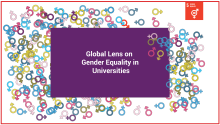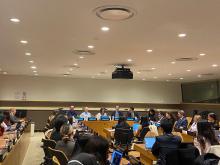Global Lens on Gender Equality in Universities: Reviewing their Performance
Gender equality has come a long way in the past few years and decades. There are more women with access to education at the tertiary level, more women in senior leadership positions, and women’s rights have developed significantly. But much more is still to be achieved since women continue to face violence and discrimination. On average, women earn lower salaries and have lower levels of access to education compared to men.
Taking Law to Society: University in India Goes Forward
Within Sustainable Development Goal 16: Peace, Justice, and Strong Institutions, a target calls explicitly for protecting human rights and fundamental freedoms. A key element for this is the creation of awareness concerning legislation tied to adequate protection. Indeed, a resolution of the United Nations Human Rights Council considered human rights education and training as “essential to the effective realization of human rights and fundamental freedoms.”
UK University Develops New Sources of Emission-Free Energy
The fifth recommendation -Phasing Out of Fossil Fuels and Scaling Up Renewable Energy- within the report launched in November 2022 by the High-Level Expert Group on the Net Zero Emissions Commitments of Non-State Entities reads: “Instead of slowing down the decarbonization of the global economy, now is the time to accelerate the energy transition to a renewable energy future.” And universities are stepping in for that.
Financing and Funding the SDGs: Challenges vs. Solutions
The United Nations Academic Impact (UNAI) is producing a series of articles related to the Sustainable Development Goals (SDGs) from various angles. In this first article, we aim for more people to get a deeper insight into the financing and funding for sustainable development, mainly what is being done at the multilateral level, especially in the context of the United Nations system.
In a complex context, more actors
University Team Creates ‘Green’ Concrete for Sustainable Construction
About 35% of landfill waste is generated by the construction industry, with millions of tons of debris and rubble disposed of each year around the globe. Similarly, around one billion automobile tires go to waste every year. Most of such tires end up in landfills causing a wide range of issues.
Creating a Smart Campus: A British University Develops a ‘Living Lab’
Universities and colleges worldwide are leading the way through various means in demonstrating the benefits of a collaborative approach of academic research and industry expertise in creating sustainable solutions that benefit everyone. They also often function as ‘small cities,’ with their energy plants, sports facilities, and civic attractions, as well as the communal study, office, and research spaces that allow their daily function. This makes them without any doubt, an ideal test bed for innovation.
German Academic-Scientific Initiative Focused on Plants for Tomorrow's Needs
“The intensification of the major drivers behind recent food insecurity and malnutrition trends (i.e., conflict, climate extremes, and economic shocks) combined with the high cost of nutritious foods and growing inequalities will continue to challenge food security and nutrition,” says one of the many conclusions of The State of Food Security and Nutrition in the World published this year by the Food and Agriculture Organization of the United Nations.
Looking for an Alternative: Spanish University Actions on Fair Trade
“International trade is an engine for inclusive economic growth and poverty reduction, and contributes to the promotion of sustainable development,” reads paragraph 68 of the 2030 Agenda for Sustainable Development.
UNAI Marks UN Day Discussing Role of Higher Education in Multilateralism
On Monday, 24 October 2022, the United Nations Academic Impact (UNAI) hosted at UN Headquarters in New York an event to mark United Nations Day, a commemoration that remembers the entry into force of the Charter of the United Nations.
Enhancing Understanding of the Tropics: Australian University Paves the Way
The Tropics is a place of extraordinary diversity, culturally and ecologically. Most of the world’s languages are spoken in the Tropics, and it is home to 80% of terrestrial biodiversity as well as 95% of the world’s coral and mangrove ecosystems. An area that also holds over half of the world’s renewable water resources. The Tropics are also where the most significant impacts from climate change are likely to be felt, with cascading effects on the rest of the world.










